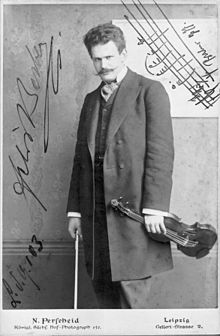Felix Berber
Karl Heinrich Felix Berber (born March 11, 1871 in Jena , † November 2, 1930 in Munich ) was a German violinist .
Life
Berber was the youngest child of parents who loved music and art. He spent the first part of his childhood in Weimar , where the family moved soon after his birth. In Dresden , where his parents had moved again, he received violin lessons from the age of 7 . As a nine-year-old he appeared in public for the first time in 1880 as a “child prodigy”. He then studied at the Dresden Conservatory and with Adolph Brodsky at the Leipzig Conservatory . As a 13-year-old he gave his first major concerts. On the recommendation of Hans von Bülow , Berber concentrated only on music after the death of his father. In 1889 he studied in London .
From 1891 to 1896 Berber was concertmaster in Magdeburg , but then went on concert tours through Europe in 1896 and 1897 , and also made guest appearances in Russia . In 1897 and 1898 he worked in Chemnitz and from 1898 to 1903 as 1st concertmaster of the Gewandhaus Orchestra in Leipzig under Arthur Nikisch .
In 1904 he was appointed as a violin teacher at the Academy of Music in Munich for the first time . In 1907 he went to the Hoch Conservatory in Frankfurt am Main as the successor to Hugo Heermann , where he founded his "Museum Quartet". In 1908 he finally went to the Conservatory in Geneva as the successor to Henri Marteau .
After a concert tour through the USA , Berber returned to the Munich Music Academy in 1913. His teaching activity was interrupted by the First World War, in which he participated as an active officer. Together with his academy colleagues Valentin Härtl ( viola ), Johannes Hegar ( cello ) and Anton Huber (violin) he formed the “Berber Quartet” in Munich in 1917. In 1920 he was appointed full professor at the Munich Music Academy.
Berber combined in his musical work both the qualities of a virtuoso soloist and the skills of a disciplined chamber music player , in addition he was an ideal teacher. He had still made music with Johannes Brahms and was a pioneer for Max Reger and Hans Pfitzner . On September 25, 1918, he gave the world premiere of Pfitzner's Sonata in E minor (op. 27) at the founding event of the “Hans Pfitzner Association” with Pfitzner himself at the piano . With his Beethoven , Brahms and Reger cycles , he secured a reputation for Munich's musical life far beyond the borders of Germany.
Berber was married to the cabaret artist and chanson singer Lucie Thiem. Both daughters were the dancer and actress Anita Berber .
literature
- Wilhelm Joseph von Wasielewski: The violin and its masters. Breitkopf & Härtel publishing house, 1920.
Web links
Josef Klingenbeck: Berber, Karl Heinrich Felix. In: New German Biography (NDB). Volume 2, Duncker & Humblot, Berlin 1955, ISBN 3-428-00183-4 , p. 61 f. ( Digitized version ).
Individual evidence
- ↑ Birgit Bernard (Ed.): Contemporaries: August Sander and the art scene of the 20s in the Rhineland , SK Stiftung Kultur, Verlag Steidl, Cologne 2000, page 232 ( excerpt )
- ↑ Stephan Schmitt: History of the University of Music and Theater Munich from the beginnings to 1945. (= Musicological writings of the University of Music and Theater Munich Volume 1.) Verlag H. Schneider, Tutzing 2005, ISBN 3-7952-1153-0 , Page 273. ( excerpt )
| personal data | |
|---|---|
| SURNAME | Berber, Felix |
| ALTERNATIVE NAMES | Berber, Karl Heinrich Felix (full name) |
| BRIEF DESCRIPTION | German violinist |
| DATE OF BIRTH | March 11, 1871 |
| PLACE OF BIRTH | Jena |
| DATE OF DEATH | November 2, 1930 |
| Place of death | Munich |
